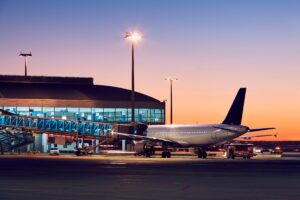
If you’re worried about recovering from an upcoming tooth extraction, you’re not alone. Many patients get anxious when it comes to dental appointments, especially if they have to undergo a surgical procedure. It’s normal to have questions about the appointment and what to expect from recovery.
For example, many patients who travel frequently for work wonder whether it’s safe to fly after their extraction. If you know you’ll need to be on a plane relatively quickly after your tooth has been removed, keep reading to learn 3 things you need to know!
#1: Wait A Couple of Days
Your dentist will provide you with specific post-op instructions to follow after your surgery. These instructions are crucial for ensuring that your mouth recovers efficiently and without complications.
Typically, they’ll advise you to take it easy for 24-48 hours as your body needs to form a blood clot over the incision site. If this process is hindered or interrupted, or the clot is dislodged, then the tender nerves and tissues are left exposed to germs in your mouth. This could lead to a painful complication known as dry socket.
While the pressure changes in an airplane’s cabin can potentially cause the essential blood clot to shift out of place, there are safety measures you can take. Waiting two or more days before you board a flight gives your mouth enough time to heal, significantly reducing the risk of complications.
#2: Manage Discomfort
It’s normal to experience some residual throbbing and inflammation for a few days following your procedure. If you’re going to be away from home, it’s a good idea to pack what you need to mitigate these symptoms.
Usually, over-the-counter medications like Tylenol and ibuprofen can sufficiently address them and are safe to take through airport security. You’ll be glad to have them with you if you develop a headache from the pressure changes once your flight takes off.
#3: Eat Soft Foods
Many airlines offer snacks at some point, like peanuts or chips, but hard and crunchy foods can irritate your extraction site or push the blood clot out of place. It’s best to stick with soft foods like yogurt, pudding, apple sauce, mild soup, and thoroughly blended smoothies.
Generally, passengers aren’t allowed to bring food through security checkpoints, but most airports have shops and restaurants closer to the gates. Why not take a few extra minutes to stock up on some easy-to-carry soft snacks so that you won’t be tempted by the midflight food?
Taking a few simple precautions can go a long way toward helping your mouth heal while you travel!
About the Practice
At Coombs, Ross & Sourlis Family Dentistry of Rock Hill, patients of all ages benefit from several dentists who work together to offer a wide array of services under one roof. They take the time to get to know you so that if a problem arises, they can quickly create a fully individualized treatment plan to address it. They utilize state-of-the-art technology to handle everything from basic preventative care to more complex procedures, like extractions. If you have a toothache or damaged tooth and need help, you can request an appointment on the website or by calling (803) 592-6201.

